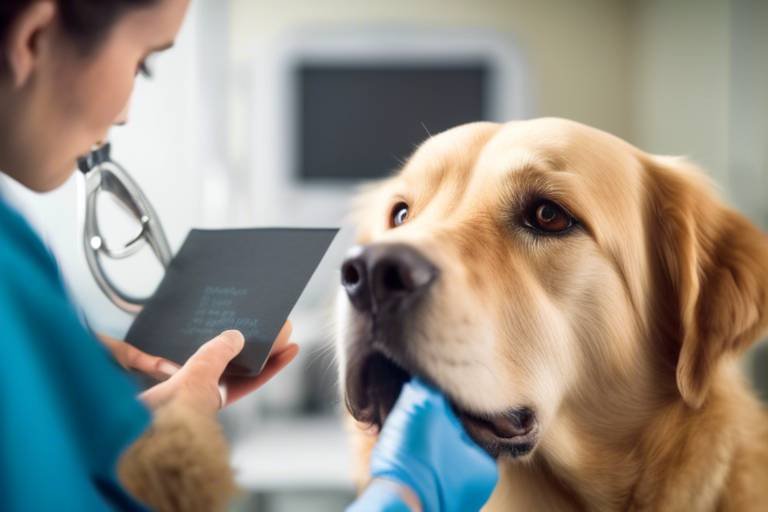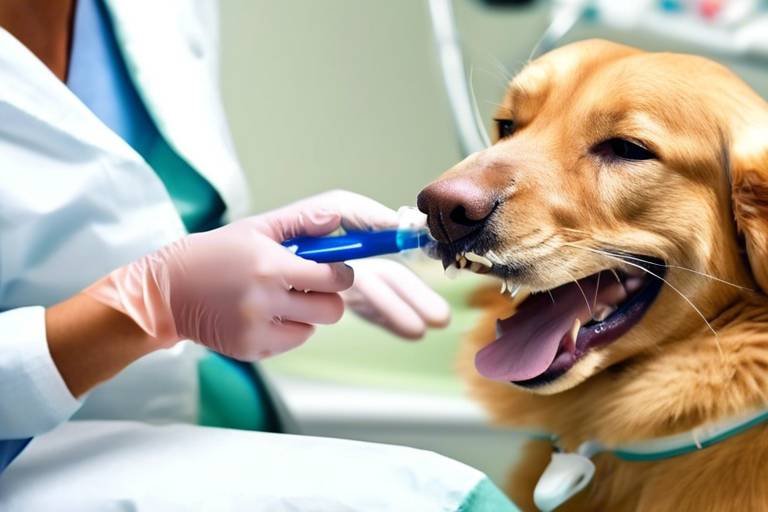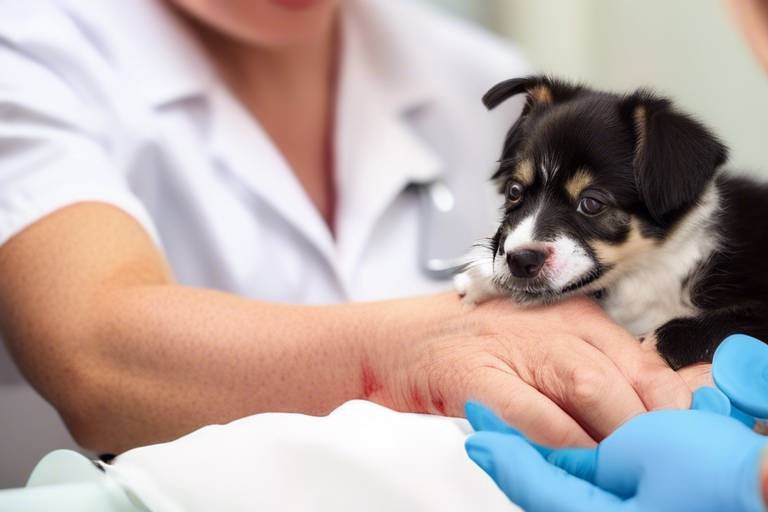The Importance of Routine Health Checks for Pets
Routine health checks are not just a formality; they are a critical component of responsible pet ownership. Just like we humans need regular check-ups to catch any potential health issues before they become serious, our furry friends require the same level of attention. Imagine being able to catch a health problem before it escalates into something life-threatening—sounds like a no-brainer, right? Well, that's exactly what routine health checks offer. They serve as a proactive measure that can lead to a longer, healthier life for your pet. In this article, we’ll dive deep into the various aspects of routine health checks, highlighting their significance in early detection and prevention of diseases.
So, what exactly do we mean by routine health checks? These checks encompass a variety of examinations and tests designed to monitor a pet's overall health. Think of it as a wellness check-up that covers everything from physical examinations to laboratory tests. During these visits, veterinarians assess your pet's weight, coat condition, and even their behavior. They might conduct blood tests, check for parasites, and evaluate dental health. The goal? To ensure that any potential issues are identified and addressed promptly, keeping your pet in tip-top shape.
Regular veterinary visits come packed with benefits that extend far beyond just checking for illnesses. Here are a few key advantages:
- Vaccinations: Keeping your pet up-to-date on their vaccinations protects them from a host of dangerous diseases.
- Dental Care: Regular check-ups include dental assessments, which can prevent serious oral health problems.
- Nutritional Advice: Vets can provide tailored dietary recommendations to ensure your pet maintains a healthy weight and receives the right nutrients.
These benefits contribute significantly to a longer, healthier life for your pets. It’s like giving them a little insurance policy against health issues!
One of the most compelling reasons to schedule routine check-ups is the early detection of diseases. Many health problems in pets can develop silently, showing few or no symptoms until they become severe. By regularly visiting the vet, you increase the chances of catching these issues early. For instance, conditions like diabetes or kidney disease can be managed much more effectively when detected early. This not only improves treatment outcomes but also enhances your pet's quality of life, allowing them to enjoy their golden years with vigor.
During routine checks, veterinarians often identify common health issues that pet owners may overlook. Some of these include:
- Obesity
- Dental disease
- Skin infections
- Ear infections
Understanding these issues empowers pet owners to recognize symptoms and seek timely veterinary care, ultimately leading to better health outcomes for their beloved companions.
Preventative care strategies discussed during health checks can be game-changers for your pet’s health. Your vet might recommend:
- Regular exercise routines
- Dietary adjustments
- Parasite prevention
By implementing these strategies, you can mitigate risks associated with various illnesses and ensure your pets remain healthy and active, much like a well-oiled machine!
Vaccinations are a cornerstone of routine health checks. They protect pets from various infectious diseases that can be severe or even fatal. Just like how we get vaccinated to prevent illnesses, our pets need the same protection. Vaccinations not only safeguard individual pets but also contribute to community health by preventing the spread of diseases.
As a pet owner, you play a vital role in your pet's health. It's not just about taking them to the vet; it's about being proactive in every aspect of their care. This includes ensuring regular check-ups, maintaining a healthy diet, and providing adequate exercise. Think of yourself as your pet’s health advocate. Your vigilance can make all the difference in their lives.
Keeping detailed health records is another essential responsibility. This not only helps you track your pet's health over time but also facilitates better-informed decisions regarding treatment and care. You can note down vaccinations, medications, and any behavioral changes. This information can be invaluable during vet visits, as it provides a comprehensive overview of your pet's health history.
Finally, it's crucial to be vigilant in recognizing behavioral changes in your pets. Just like how we might feel under the weather and act differently, pets can exhibit changes in behavior that may indicate underlying health issues. Whether it's a sudden lack of energy, changes in appetite, or unusual aggression, these signs should not be ignored. They can be critical indicators that your pet needs veterinary attention.
Q: How often should I take my pet for a health check?
A: Generally, it's recommended to take your pet for a check-up at least once a year. However, older pets or those with existing health issues may require more frequent visits.
Q: What should I expect during a routine health check?
A: Expect a thorough examination, including weight checks, dental assessments, and possibly blood tests. Your vet will also discuss vaccination schedules and dietary needs.
Q: Are routine health checks expensive?
A: While there is a cost associated with veterinary visits, the long-term savings from preventing serious health issues often outweigh these costs.
Q: Can I skip a health check if my pet seems healthy?
A: It's not advisable to skip health checks. Many health issues can go unnoticed until they become serious, so regular check-ups are essential.

Understanding Routine Health Checks
When we think about our furry friends, their health often takes a backseat to the daily hustle and bustle of life. However, routine health checks are essential for keeping our pets in tip-top shape. These check-ups are not just about ensuring your pet looks good on the outside; they dive deeper into their overall health and well-being. Imagine it as a regular tune-up for your car—without it, small issues can snowball into major problems.
Routine health checks typically include a comprehensive examination by a veterinarian, which may involve:
- Physical Examination: The vet will check your pet’s weight, coat condition, and overall demeanor. A thorough physical exam can reveal a lot about your pet's health.
- Blood Tests: These can help identify underlying issues such as kidney disease, diabetes, or infections that may not be immediately visible.
- Urinalysis: This test can provide insights into your pet’s kidney function and detect urinary tract infections.
- Vaccinations: Keeping your pet up to date with vaccines is crucial for preventing serious diseases.
During these visits, veterinarians will also discuss your pet's diet, exercise habits, and any behavioral changes you might have noticed. It’s a great time to ask questions and gain insights into how to keep your pet healthy and happy. Think of it as a collaborative effort between you and your vet to ensure your pet lives a long, fulfilling life.
Moreover, routine health checks allow for the early detection of potential health issues. Just like in humans, catching a problem early can make all the difference. For instance, if your vet finds an abnormality in a blood test, they can address it before it escalates into something more serious. This proactive approach not only saves you money in the long run but also ensures your pet enjoys a better quality of life.
In summary, understanding the importance of routine health checks is vital for any pet owner. They are an opportunity to catch health issues early, discuss your pet's lifestyle, and ensure they are up to date on vaccinations. Just like we schedule our own health check-ups, making regular vet visits for our pets should be a priority. After all, they depend on us to keep them healthy!

Benefits of Regular Vet Visits
Regular veterinary visits are not just a formality; they are a necessity for your furry companions. Think of it as a routine check-up for your pet, similar to how we humans go for our annual physicals. These visits play a crucial role in ensuring that our pets live long, healthy, and fulfilling lives. They offer a plethora of benefits that go beyond just vaccinations and medications.
One of the most significant advantages of regular vet visits is the preventive care they provide. During these check-ups, veterinarians can perform a variety of tests and examinations that help identify potential health issues before they escalate into serious problems. For example, routine blood tests can reveal underlying conditions such as diabetes or kidney disease, which might not show obvious symptoms until they are advanced. This early detection can be a game-changer, allowing for timely interventions that can save your pet's life.
Moreover, regular visits ensure that your pet stays up-to-date on essential vaccinations. Vaccinations are vital in protecting pets from infectious diseases that can be fatal or severely debilitating. For instance, diseases like parvovirus in dogs or feline leukemia in cats can be effectively prevented through timely vaccinations. By keeping your pet's immunizations current, you are not only safeguarding their health but also contributing to the overall well-being of the pet community.
Additionally, these visits provide an opportunity for veterinary professionals to offer valuable advice on nutrition and weight management. Obesity is a growing concern among pets, leading to a myriad of health issues such as arthritis, diabetes, and heart disease. A veterinarian can help you tailor a diet plan that meets your pet's specific needs, ensuring they maintain a healthy weight and lifestyle.
Another often overlooked benefit of regular vet visits is the dental care they can provide. Dental health is crucial for pets, as poor oral hygiene can lead to serious health issues, including infections and organ damage. During check-ups, vets can assess your pet's dental health, perform cleanings, and provide guidance on at-home dental care routines. After all, a healthy mouth contributes to a healthy body!
In summary, the benefits of regular veterinary visits are extensive and multifaceted. They encompass preventive care, vaccinations, nutritional advice, and dental health, all of which are vital components of your pet's overall well-being. By prioritizing these visits, you are investing in your pet's long-term health and happiness.
In conclusion, think of regular vet visits as a safety net for your beloved pet. They not only help catch potential health issues early but also provide a wealth of information and resources to keep your furry friend in tip-top shape. So, don’t wait for signs of illness—schedule that vet appointment today!
Q: How often should I take my pet to the vet?
A: It is generally recommended to take your pet to the vet at least once a year, but older pets or those with health issues may need more frequent visits.
Q: What should I expect during a routine vet visit?
A: During a routine visit, the vet will perform a physical examination, discuss any concerns you may have, provide vaccinations, and may recommend tests based on your pet's age and health.
Q: Are vaccinations necessary for indoor pets?
A: Yes, vaccinations are necessary for indoor pets as they can still be exposed to diseases through contact with other animals or contaminated environments.
Q: How can I help my pet stay healthy between vet visits?
A: Regular exercise, a balanced diet, dental care, and monitoring for any behavioral changes can significantly contribute to your pet's health between visits.
Early Disease Detection
Routine health checks for pets are not just a formality; they are a vital lifeline that can significantly impact your furry friend's health. Imagine catching a potential health issue before it escalates into something serious! That's the magic of early disease detection. During these check-ups, veterinarians conduct thorough examinations that can reveal hidden problems, often before your pet even shows symptoms. This proactive approach is akin to finding a small leak in your roof before it turns into a full-blown flood.
For instance, many pets suffer from conditions such as diabetes, kidney disease, or heart issues, which may not be immediately apparent. Regular visits allow vets to perform blood tests, urine analysis, and even imaging studies to assess your pet's internal health. These tests can reveal important indicators that might otherwise go unnoticed. For example:
| Common Tests | What They Detect |
|---|---|
| Blood Test | Can identify issues with organs, blood sugar levels, and more. |
| Urinalysis | Helps detect urinary tract infections, kidney problems, and diabetes. |
| X-rays | Can reveal bone fractures, tumors, or heart enlargement. |
By catching these issues early, you not only improve the chances of successful treatment but also enhance your pet's quality of life. Think about it: wouldn't you want to know if something was amiss with your health before it became a major concern? The same goes for our pets. They rely on us to be their advocates, and that means being proactive about their health.
Moreover, early detection often leads to less invasive treatments and can save you money in the long run. For example, managing a chronic condition early on may only require medication or dietary adjustments, rather than more extensive and costly interventions down the line. It's a win-win situation!
In conclusion, regular health checks are essential for early disease detection in pets. They not only help in identifying potential health issues but also empower pet owners to take action before problems escalate. So, make that appointment today—your pet's health is worth it!
Common Health Issues in Pets
Just like humans, our furry companions can face a variety of health issues throughout their lives. Understanding these common health problems is crucial for pet owners, as it empowers them to recognize symptoms early and seek timely veterinary care. Some of the most prevalent health issues in pets include:
- Obesity: One of the most common issues, obesity can lead to serious health problems such as diabetes, heart disease, and joint issues. It's essential to monitor your pet's weight and adjust their diet and exercise accordingly.
- Dental Disease: Poor dental hygiene can result in periodontal disease, which not only affects the mouth but can also lead to systemic health issues. Regular dental check-ups and cleanings are vital.
- Skin Allergies: Pets can suffer from allergies just like humans. Symptoms may include itching, redness, and hair loss. Identifying the allergen is key to providing relief.
- Ear Infections: Common in breeds with floppy ears, ear infections can cause discomfort and lead to more severe complications if left untreated. Regular ear cleaning can help prevent these infections.
- Parasites: Fleas, ticks, and worms can wreak havoc on a pet's health. Regular check-ups can help in administering preventative treatments and keeping these pests at bay.
Being aware of these common health issues allows pet owners to be proactive rather than reactive. For instance, if you notice your pet scratching more than usual or losing weight unexpectedly, it could be a sign of an underlying condition. Regular vet visits provide an opportunity for thorough examinations, allowing for early detection of these issues.
Moreover, understanding the symptoms associated with these health problems can make a significant difference. For example, if your dog is suddenly lethargic or your cat is hiding more than usual, these behavioral changes can indicate health concerns that need immediate attention. By staying informed and observant, you can help ensure your pet lives a long, healthy, and happy life.
In conclusion, being knowledgeable about common health issues in pets not only helps in early detection but also fosters a deeper bond between you and your furry friend. Remember, a healthy pet is a happy pet!
Q: How often should I take my pet for a routine health check?
A: It is generally recommended to take your pet for a routine health check at least once a year. However, older pets or those with pre-existing health conditions may require more frequent visits.
Q: What should I expect during a routine health check?
A: During a routine health check, the veterinarian will perform a physical examination, discuss your pet's diet and behavior, and may recommend vaccinations or tests based on your pet's age and health status.
Q: How can I help prevent health issues in my pet?
A: You can help prevent health issues by providing a balanced diet, ensuring regular exercise, maintaining dental hygiene, and scheduling routine veterinary check-ups.
Q: What are the signs that my pet may be experiencing health issues?
A: Signs may include changes in appetite, weight loss or gain, lethargy, unusual behavior, vomiting, diarrhea, or excessive scratching. If you notice any of these symptoms, consult your veterinarian.
Preventative Care Strategies
When it comes to ensuring the health and happiness of our furry companions, are absolutely essential. Think of these strategies as the foundation of a sturdy house; without a solid base, everything else is at risk. Regular check-ups with the vet allow for the implementation of these strategies, which can significantly reduce the chances of your pet falling ill. So, what exactly does preventative care entail? Well, it covers a wide range of practices that aim to maintain your pet's health and prevent diseases before they even start.
One of the key components of preventative care is vaccination. Vaccines protect pets from a host of serious diseases, including rabies, parvovirus, and distemper. Just like humans, pets need to stay up-to-date with their vaccinations to ensure they are shielded from these threats. During routine health checks, your veterinarian will assess your pet's vaccination history and recommend any necessary updates. It's a simple yet effective way to safeguard your pet's health.
Another crucial aspect of preventative care is nutritional guidance. Just as the right fuel keeps a car running smoothly, a balanced diet keeps your pet healthy and energetic. Your vet can help you choose the best diet tailored to your pet's specific needs, taking into account their age, breed, and any existing health conditions. Regular weigh-ins during health checks can also help in monitoring your pet's weight, ensuring they stay within a healthy range.
Moreover, exercise plays a pivotal role in a pet's overall well-being. Regular physical activity helps maintain a healthy weight, reduces anxiety, and strengthens the bond between you and your pet. During check-ups, your vet can suggest appropriate exercise routines based on your pet's age and breed. Whether it's a brisk walk, a game of fetch, or interactive playtime, keeping your pet active is a crucial part of their preventative care.
Lastly, dental care is often overlooked but is vital for your pet's health. Just like humans, pets can suffer from dental diseases if their teeth are not properly cared for. Routine health checks can include dental examinations, and your vet may recommend professional cleanings or at-home care strategies. Keeping those pearly whites in check not only prevents bad breath but also reduces the risk of more severe health issues down the line.
In summary, incorporating these preventative care strategies into your pet's health routine can lead to a longer, healthier, and happier life. By staying proactive rather than reactive, you can catch potential health issues early and ensure your furry friend remains vibrant and active for years to come.
- How often should I take my pet for a health check?
It is generally recommended to take your pet for a routine check-up at least once a year. However, older pets or those with existing health issues may require more frequent visits. - What vaccinations does my pet need?
The vaccinations required can vary based on your pet's age, lifestyle, and health. Consult your veterinarian for a tailored vaccination schedule. - How can I tell if my pet is overweight?
A good rule of thumb is to feel your pet's ribs. You should be able to feel them without excess fat covering. Your vet can also provide guidance on ideal weight ranges for your pet's breed and age.
Vaccination Importance
Vaccinations are not just a routine part of pet ownership; they are a critical shield against a myriad of infectious diseases that can threaten your furry friend's health. Think of vaccinations as a fortress built around your pet, protecting them from illnesses that could otherwise lead to severe health complications or even death. Just as we humans receive vaccines to fend off diseases like the flu or measles, our pets also require their own set of vaccinations to stay healthy and safe.
One of the most compelling reasons to prioritize vaccinations is the concept of herd immunity. When a significant portion of the pet population is vaccinated, it creates a protective barrier that not only safeguards individual animals but also the community at large. This is especially crucial for pets that may not be able to be vaccinated due to health conditions. By ensuring your pet is vaccinated, you contribute to the overall health of other animals in your area.
Moreover, many vaccinations are not a one-time event. They often require a series of shots to build up immunity effectively. For example, puppies typically receive a series of vaccinations starting at six to eight weeks of age, with boosters given at regular intervals. This schedule is essential to ensure that their immune systems develop adequately. Here’s a quick overview of some common vaccinations:
| Vaccination | Recommended Age | Frequency |
|---|---|---|
| Distemper | 6-8 weeks | Every 3-4 weeks until 16 weeks |
| Parvovirus | 6-8 weeks | Every 3-4 weeks until 16 weeks |
| Rabies | 12-16 weeks | Every 1-3 years, depending on local laws |
In addition to protecting against serious diseases, vaccinations can also help prevent the spread of illnesses to other pets. For instance, diseases like kennel cough or feline leukemia can spread rapidly in shelters or among unvaccinated animals in the community. By vaccinating your pet, you're not only protecting them but also acting as a responsible pet owner who cares about the well-being of other animals.
It's important to consult with your veterinarian to create a vaccination schedule tailored to your pet’s specific needs, taking into account factors such as age, health status, and lifestyle. Regular veterinary visits will help ensure that your pet remains up-to-date on their vaccinations and that any potential health issues are addressed promptly.
In conclusion, vaccinations are an indispensable part of responsible pet ownership. They serve as a vital line of defense against preventable diseases, promote community health, and ensure that our beloved pets lead long, healthy lives. So, the next time you think about skipping that vet appointment, remember: a simple shot can make a world of difference!
- How often should my pet be vaccinated? - Most pets require vaccinations annually or biannually, depending on the vaccine and local regulations.
- Are there any side effects to vaccinations? - While side effects are rare, some pets may experience mild reactions such as swelling at the injection site or lethargy.
- Can my pet be vaccinated if they are sick? - It's best to consult with your veterinarian. They will assess your pet's health before administering any vaccines.
- What vaccinations are essential for my pet? - Core vaccinations include those for rabies, distemper, and parvovirus, but your vet will recommend additional ones based on your pet's lifestyle.

Owner Responsibilities
As a pet owner, you hold a pivotal role in ensuring your furry friend lives a long, healthy life. It's not just about providing food and shelter; it's about being proactive in their health care. Regular check-ups are just the tip of the iceberg. You need to be vigilant and committed. So, what exactly does being a responsible pet owner entail?
First and foremost, scheduling those routine health checks is essential. Think of it like a car needing regular maintenance; if you ignore the warning signs, you might find yourself stranded on the side of the road. By taking your pet to the vet regularly, you can catch any potential issues before they escalate. This means not only vaccinations but also dental check-ups and nutritional assessments. You wouldn’t want to drive a car with an engine light on, right? The same goes for your pet's health!
Another significant aspect of your responsibilities is maintaining a balanced diet for your pet. Just like us, pets require a diet that meets their specific needs based on age, size, and health conditions. A well-balanced diet can help prevent obesity, diabetes, and other health issues. Make sure to consult your veterinarian about the best food options for your pet. Remember, feeding them table scraps might seem harmless, but it could lead to serious health problems down the line.
Moreover, regular exercise is crucial. Pets need physical activity to stay fit and happy. Just like we feel sluggish after a day of sitting, so do our pets. Daily walks, playtime in the yard, or even a trip to the dog park can do wonders for their physical and mental well-being. Think about it: a tired pet is often a happy pet! Plus, these activities strengthen the bond between you and your furry companion.
It's also important to keep a close eye on your pet's behavior. Animals can’t speak, but they communicate in their own ways. If your pet suddenly becomes lethargic, refuses to eat, or shows signs of distress, it’s crucial to take these changes seriously. These could be indicators of underlying health issues that need immediate veterinary attention. Just like a sudden change in a friend's mood can signal something's wrong, so can a shift in your pet's behavior.
Lastly, keeping detailed health records is a responsibility that shouldn't be overlooked. Documenting your pet's vaccinations, illnesses, and treatments can help both you and your veterinarian make informed decisions about their care. You wouldn’t want to forget when your car last had an oil change, would you? The same applies to your pet's health history. A simple table can help keep track of this information:
| Date | Visit Type | Notes |
|---|---|---|
| 01/15/2023 | Routine Check-up | Vaccination updated, dental check performed |
| 03/10/2023 | Dental Cleaning | Teeth cleaned, no extractions needed |
| 06/20/2023 | Annual Check-up | All clear, suggested weight management plan |
In conclusion, being a responsible pet owner is a multifaceted commitment. It's about being proactive and attentive to your pet's needs, from regular vet visits to keeping an eye on their diet and exercise. Remember, your furry friend relies on you for their health and happiness. By fulfilling these responsibilities, you're not just ensuring their well-being; you're also enriching your own life with the joy that comes from a healthy, happy pet.
- How often should I take my pet to the vet? It's generally recommended to take your pet for a check-up at least once a year, though some pets may require more frequent visits based on their health needs.
- What should I do if I notice a change in my pet's behavior? Any significant behavioral change should be discussed with your veterinarian as it may indicate an underlying health issue.
- How can I keep track of my pet's health records? You can maintain a simple table or spreadsheet that includes dates, types of visits, and notes on your pet's health.
Tracking Health Records
Keeping track of your pet’s health records is like holding a treasure map that leads to their well-being. Imagine trying to navigate through a dense forest without a map—you might miss important landmarks or, worse, get lost! In the same way, maintaining accurate health records allows you to monitor your pet's health journey, ensuring you're never in the dark about their medical history. These records provide valuable insights into your pet’s health trends, vaccination status, and any past medical issues, which can be crucial during veterinary visits.
So, what should you include in your pet’s health records? Here are some essential elements:
- Vaccination History: Keep a detailed list of all vaccinations your pet has received, including dates and types of vaccines. This is vital for ensuring your pet remains protected against preventable diseases.
- Medical Treatments: Document any treatments or medications your pet has undergone. This information helps your vet understand what has been tried before and what might work moving forward.
- Weight Records: Regularly noting your pet's weight can help identify any sudden changes that may indicate health issues, such as obesity or underlying diseases.
- Behavioral Observations: Jot down any significant changes in behavior, eating habits, or energy levels. These notes can provide your vet with crucial clues about your pet’s health.
Moreover, consider using a digital platform or app to store these records. Digital records are easily accessible and can be shared with your veterinarian at the click of a button. This not only saves time but also ensures that you have all the necessary information readily available during emergencies. By keeping your pet’s health records organized and up-to-date, you empower yourself to make informed decisions about their care and treatment.
In addition to personal records, many veterinary clinics now offer online portals where you can view and manage your pet's health history. This feature allows you to stay on top of appointments, vaccinations, and any upcoming procedures. Being proactive in tracking your pet's health can lead to early detection of potential issues, ultimately resulting in a longer and healthier life for your beloved companion.
Here are some common questions pet owners have regarding tracking health records:
- How often should I update my pet's health records? It's best to update them after every veterinary visit, including vaccinations and treatments.
- What should I do if I lose my pet's health records? Contact your veterinarian; they can often provide you with a copy of your pet's medical history.
- Can I maintain health records for multiple pets? Absolutely! Just keep separate records for each pet to avoid confusion.
Recognizing Behavioral Changes
As pet owners, we often think we know our furry friends inside and out, but sometimes subtle changes in behavior can signal that something isn’t quite right. Just like humans, pets can experience a wide range of emotions and health issues that may manifest through their actions. So, how can you tell if your pet is feeling off? The key lies in being observant and knowing what to look for.
One of the first signs that something may be amiss is a shift in your pet's energy levels. If your usually playful pup suddenly becomes lethargic, or your cat who loves to chase after toys is now lounging around all day, it might be time to investigate further. Additionally, changes in appetite can be a red flag. Is your pet refusing to eat their favorite treats or suddenly gobbling down food like there’s no tomorrow? Both scenarios can indicate underlying health concerns that warrant a visit to the vet.
Another area to monitor is your pet's social behavior. Have they become more withdrawn or aggressive? Changes in how your pet interacts with family members or other animals can reveal a lot about their emotional state. For instance, if a normally friendly dog starts barking at visitors or a cat that usually cuddles up is hiding under the bed, these shifts could indicate stress, anxiety, or discomfort.
It’s also important to keep an eye on grooming habits. Over-grooming can lead to skin irritations, while neglecting grooming can signal depression or health issues. If your pet is suddenly scratching excessively or has matted fur, it’s best to consult your veterinarian. Remember, pets can’t tell us when they’re feeling unwell, so we must be their advocates.
Here’s a quick table summarizing some common behavioral changes to watch for:
| Behavioral Change | Possible Indicator |
|---|---|
| Lethargy | Possible illness or pain |
| Changes in Appetite | Health issues or stress |
| Social Withdrawal | Anxiety or discomfort |
| Excessive Grooming | Skin issues or stress |
| Aggression | Pain or fear |
Ultimately, being proactive in recognizing these behavioral changes can make a significant difference in your pet's health and happiness. If you notice any of these signs, don’t hesitate to reach out to your veterinarian. They can provide guidance and help ensure your beloved companion stays healthy and vibrant.
- How often should I take my pet for routine health checks? It's generally recommended to have your pet checked at least once a year, but older pets or those with health issues may need more frequent visits.
- What should I do if I notice a sudden change in my pet's behavior? If you notice any significant changes, it’s best to consult your veterinarian as soon as possible to rule out any health concerns.
- Are there specific signs that indicate my pet is in pain? Yes, signs of pain can include vocalizing, reluctance to move, changes in appetite, and hiding. Always consult your vet if you suspect pain.
Frequently Asked Questions
- Why are routine health checks important for my pet?
Routine health checks are essential because they help identify potential health issues before they become serious. Just like how we go for regular check-ups to catch problems early, our pets benefit from the same practice. These visits can lead to early disease detection, ensuring that your furry friend stays healthy and happy for as long as possible.
- How often should I take my pet to the vet?
It's generally recommended to take your pet for a check-up at least once a year. However, younger pets, senior pets, or those with existing health issues may need more frequent visits. Think of it like a car maintenance schedule; regular check-ups can keep everything running smoothly!
- What can I expect during a routine health check?
During a routine health check, your veterinarian will perform a physical examination, check your pet’s weight, and discuss any concerns you might have. They may also recommend vaccinations, dental care, and nutritional advice tailored to your pet's specific needs. It's a comprehensive look at your pet's overall health!
- Are vaccinations really necessary?
Absolutely! Vaccinations are crucial for protecting your pet from various infectious diseases. Just like we get vaccinated to prevent illness, our pets need them too. Keeping up with their vaccination schedule helps ensure their health and the health of the community.
- What are some common health issues that can be detected?
Common health issues include dental disease, obesity, skin conditions, and ear infections. Regular check-ups allow your vet to catch these problems early, often before you even notice any symptoms at home. It's like having a sneak peek into your pet's health!
- How can I track my pet's health records effectively?
Keeping detailed health records is a great way to monitor your pet's health over time. You can use a notebook, an app, or even a simple spreadsheet to log vet visits, vaccinations, and any health concerns. This information can help you and your vet make informed decisions about your pet's care.
- What should I do if I notice behavioral changes in my pet?
If you notice any changes in your pet's behavior, such as increased aggression, lethargy, or changes in eating habits, it's important to consult your veterinarian. These changes can be indicators of underlying health issues, and catching them early can make all the difference!



















